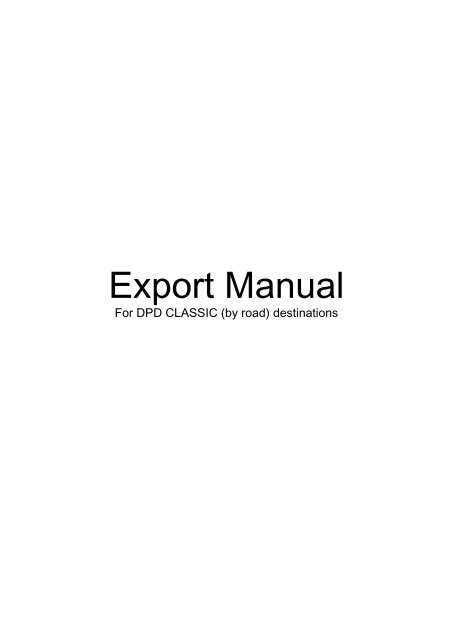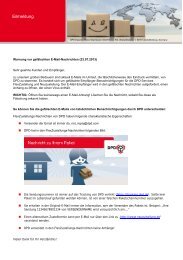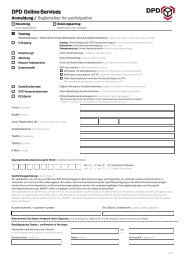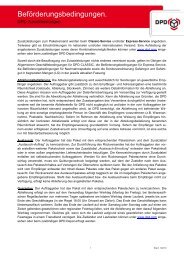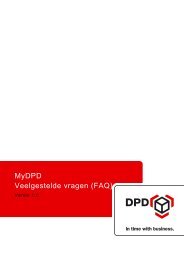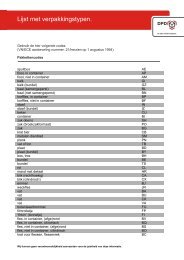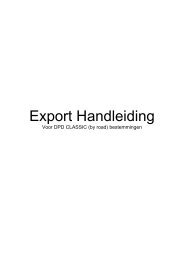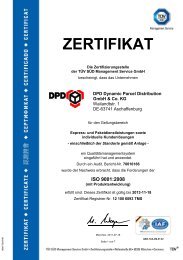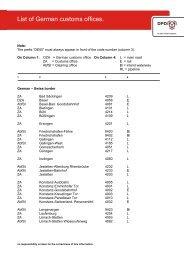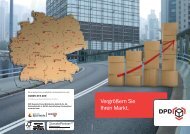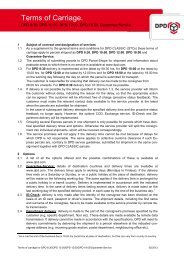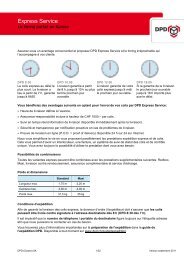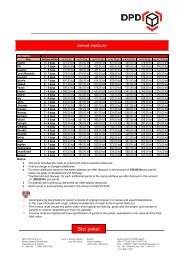Export Manual - DPD
Export Manual - DPD
Export Manual - DPD
You also want an ePaper? Increase the reach of your titles
YUMPU automatically turns print PDFs into web optimized ePapers that Google loves.
<strong>Export</strong> <strong>Manual</strong><br />
For <strong>DPD</strong> CLASSIC (by road) destinations
<strong>Export</strong> <strong>Manual</strong><br />
<strong>Export</strong> information for <strong>DPD</strong> CLASSIC (by road) destinations<br />
Content<br />
General export information 03<br />
<strong>Export</strong> within the EU 06<br />
<strong>Export</strong> information Bosnië, Kroatië en Servië 07<br />
Andorra 08<br />
Bosnia 09<br />
Channel Islands 10<br />
Croatia 11<br />
Iceland 13<br />
Liechtenstein 14<br />
Norway 16<br />
Serbia 17<br />
Switzerland 18<br />
Versie: April 2012 2
<strong>Export</strong> <strong>Manual</strong><br />
<strong>Export</strong> information for <strong>DPD</strong> CLASSIC (by road) destinations<br />
General export information<br />
EORI number<br />
As a result of new European rules, businesses with establishments in Europe will receive an EORI<br />
(Economic Operator Registration Identification) number. The EORI number replaces the current tax<br />
reference number of a business.<br />
The EORI number consists of the Dutch tax reference number minus the last three digits. For example<br />
NL123456789B01 becomes NL123456789.<br />
If the tax reference number consists of less than 9 digits, the EORI number will be supplemented with<br />
leading zeros.<br />
EUR.1 certificate<br />
A EUR.1 certificate is applicable for shipment with a value of 6.000 Euro or more with a preferential origin.<br />
The certificate allows for a zero or reduced duty levy upon the import of designated goods originating from<br />
EFTA or EU countries.<br />
The consignor is responsible for issuing the EUR.1 certificate. It’s not possible for <strong>DPD</strong> to provide this<br />
service. It’s important that the certificate is stamped by customs. A shipment will be stopped at the border in<br />
case there are no stamps on the certificate.<br />
EUR.1 certificaat<br />
Invoice<br />
There should be five original invoices present on a shipment. The invoice has to be issued in either English<br />
or German. Invoices that are issued in Dutch are not accepted.<br />
In case a shipment contains more than one parcel the invoices and Electronic Accompanying Documents<br />
(EAD, customs documents) should only be put onto the first parcel.<br />
If the invoices and electronic accompanying documents are put onto each parcel within the shipment they<br />
will be handled as separate shipments. As a result the consignee will have to pay duties and / or taxes for<br />
each parcel within the shipment.<br />
The list below, with required invoice information, covers the general requirements. Please consult the<br />
country information in this document for more detailed information.<br />
The name and complete address of the consignor.<br />
The name and complete address (incl. phone number) of the consignee.<br />
A number and date of issue of the invoice.<br />
PID (Personal ID) or VAT number.*<br />
EORI number from the consignor.<br />
A clear description of each item in the shipment.<br />
A commodity code per item.<br />
The gross and net weight of the shipment.**<br />
Mention of amount per item.<br />
Mention of value per item and a total amount for the total shipment.<br />
Currency indication.<br />
Mention of country of origin or declaration of origin.<br />
The parcel numbers of each parcel within the shipment.<br />
*The mention of the PID number for private consignees or VAT number for business consignees is only<br />
applicable for shipments to Norway.<br />
Versie: April 2012 3
<strong>Export</strong> <strong>Manual</strong><br />
<strong>Export</strong> information for <strong>DPD</strong> CLASSIC (by road) destinations<br />
**The weight is used for issuing export declarations and to calculate the amount duties that have to be paid<br />
when importing into Switzerland. If no weight is mentioned on the invoice it could lead to delays.<br />
Shipments containing goods that have been repaired are subject to additional rules. It’s important that the<br />
following information is mentioned on the invoice:<br />
The value of the product.<br />
The value of repair work done (amount of hours with tariff per hour).<br />
The value of the parts that have been used in the repair.<br />
Customs offices<br />
If EAD’s are issued an indication has to be given which customs office will be used as a point of passage or<br />
exit. Below is a list of customs offices used by <strong>DPD</strong>. The name of the office is mentioned first followed by the<br />
office code.<br />
Norway<br />
Flensburg Port, DE006132<br />
Serbia, Bosnia & Croatia<br />
Izpostava Gruskovje, SI007075<br />
Switzerland<br />
St. Louis Autoroute, FR004050<br />
Incoterms<br />
The incoterms provide information about the delivery conditions used to deliver a shipment. The standard<br />
incoterm used by <strong>DPD</strong> is DAP (Delivered At Place) Cleared. By using this incoterm the consignor pays the<br />
handling charges and the duties and / or taxes are paid by the consignee.<br />
It’s important that the final destination is mentioned with the incoterm. Without the final destination mentioned<br />
the incoterm will not be considered valid.<br />
In case the consignee refuses to pay these charges they will be charged to the consignor.<br />
Versie: April 2012 4
<strong>Export</strong> <strong>Manual</strong><br />
<strong>Export</strong> information for <strong>DPD</strong> CLASSIC (by road) destinations<br />
Preferential origin<br />
If the items in a shipment are of preferential origin (EU or EFTA origin) they are applicable for a zero or<br />
reduced duty levy upon import.<br />
In order to take advantage of this agreement a declaration of origin has to be mentioned on the invoice.<br />
The below declarations of origin have be too mentioned literally on the invoice. Any deviation will result in a<br />
rejection from customs and the consignee will be liable for the full amount of duties.<br />
It’s also important that the declarations are not hand-written on the invoice or added on a separate piece of<br />
paper. Customs will reject such declarations.<br />
German<br />
Der Ausführer der Waren, auf die sich dieses Handelspapier bezieht, erklärt, daβ diese Waren soweit nicht<br />
anders angegeben, präferenzbegünstigte EU-ursprungswaren sind.<br />
English<br />
The exporter of the goods, covered by this document, declares that, except where otherwise clearly<br />
indicated, these products are of EEC-preferential origin.<br />
Country of origin<br />
In case the items in the shipment don’t have a preferential origin, the country of origin should be mentioned.<br />
The country of origin is the country where the items have been produced. It’s not the country where the<br />
goods have been sent from.<br />
For example, if the items are produced in China it should be mentioned on the invoice as “Made in China” or<br />
“COO (Country of Origin) China”.<br />
Versie: April 2012 5
<strong>Export</strong> <strong>Manual</strong><br />
<strong>Export</strong> information for <strong>DPD</strong> CLASSIC (by road) destinations<br />
<strong>Export</strong> within the European Union<br />
Shipments with a destination within the European Union do not have to be accompanied by invoices (a few<br />
exceptions apply).<br />
EU Countries<br />
Austria, Belgium, Bulgaria, Cyprus, Czech Republic, Denmark, Estonia, Finland, France, Greece, Germany,<br />
Hungary, Ireland, Italy, Latvia Lithuania, Luxembourg, Malta, Poland, Portugal, Romania, Slovenia, Slovakia,<br />
Spain, Sweden and the United Kingdom.<br />
There are a few exceptions within the EU which do require an invoice:<br />
Madeira & Azores (Portuguese islands, postal code 9XXXX).<br />
Five original invoices with the phone number of the consignee.<br />
Canary Islands (Spanish islands, postal code 35XXX & 38XXX)<br />
Five original invoices with the phone number of the consignee. It is obligatory to mention the VAT number<br />
(business consignee) or ID number (private consignee) on the invoice.<br />
Ceuta & Melilla (Spanish territory in Africa, postal code 51XXX & 52XXX)<br />
Five original invoices with the phone number of the consignee.<br />
Campione D’Italia, Livigno, San Marino & Vatican City (Italy)<br />
Five original invoices with the phone number of the consignee.<br />
Busingen (Germany, postal code 78266)<br />
Five original invoices with the phone number of the consignee.<br />
Helgoland (Germany, postal code 27998)<br />
Five original invoices with the phone number of the consignee.<br />
Mont Athos (Greece)<br />
Five original invoices with the phone number of the consignee.<br />
Åland Eilanden (Finland, Postal code 22XXX)<br />
Five original invoices with the phone number of the consignee.<br />
Versie: April 2012 6
<strong>Export</strong> <strong>Manual</strong><br />
<strong>Export</strong> information for <strong>DPD</strong> CLASSIC (by road) destinations<br />
<strong>Export</strong> information Bosnia, Croatia and Serbia<br />
Customs handling<br />
The customs handling for Bosnia, Croatia and Serbia is done in Slovenia.<br />
The customs office of passage / exit is Izpostava Gruskovje, SI007075.<br />
Document shipments<br />
It’s not possible to sent document shipments through the road service to Croatia, Serbia or Bosnia.<br />
Restrictions<br />
Due to high duties and license requirements it is not recommended to ship the following goods to Bosnia,<br />
Croatia and Serbia:<br />
Animal food<br />
Plants<br />
Foodstuff<br />
Alcoholic drinks<br />
Incoterms<br />
Shipments to Bosnia, Croatia or Serbia can only be sent under the incoterm DAP. Any shipment with another<br />
incoterm will be held in Slovenia.<br />
Kosovo<br />
It’s not possible to print a label for Kosovo within Delisprint. Parcels for this destination will have to be routed<br />
under Serbia (RS).<br />
Versie: April 2012 7
<strong>Export</strong> <strong>Manual</strong><br />
<strong>Export</strong> information for <strong>DPD</strong> CLASSIC (by road) destinations<br />
Andorra (AD)<br />
Invoice<br />
Five original invoices (pro-forma or commercial) have to be included with the shipment. A zero-value invoice<br />
is not allowed. The invoice should contain the following information:<br />
The name and full address of the consignor.<br />
The name and full address (incl. phone number) of the consignee.<br />
A number and date of issue of the invoice.<br />
EORI number from the consignor.<br />
A clear description of each item.<br />
A commodity code per item.<br />
An amount reference per item.<br />
A value per item and the total value for the entire shipment.<br />
Currency information.<br />
Standard <strong>DPD</strong> incoterm: DAP cleared. If another incoterm is applicable is has to be clearly mentioned on<br />
the invoice. It’s mandatory to mention the final destination with each incoterm.<br />
Each shipment to Andorra has to be accompanied by a “Autorizacion de despacho y representación’’<br />
document which has been filled in by the consignor.<br />
With this document permission is given to the broker to act as a fiscal representative on behalf of the<br />
consignor.<br />
Documents<br />
Document shipments up to two kilograms do not need to be accompanied by an invoice. Shipments above<br />
this weight have to ship as a parcel with invoice.<br />
Restrictions<br />
It’s not allowed to ship the following items to Andorra:<br />
Antiques<br />
Furs<br />
Gambling devices<br />
Payment cards<br />
Precious metals<br />
Versie: April 2012 8
<strong>Export</strong> <strong>Manual</strong><br />
<strong>Export</strong> information for <strong>DPD</strong> CLASSIC (by road) destinations<br />
Bosnia (BA)<br />
Invoice<br />
Five original invoices (pro-forma or commercial) have to be included with the shipment. A zero value invoice<br />
is not allowed. The invoice should contain the following information:<br />
The name and full address of the consignor.<br />
The name and full address (incl. phone number) of the consignee.<br />
A number and date of issue of the invoice.<br />
EORI number from the consignor.<br />
The parcel numbers of each parcel in the shipment<br />
A clear description of each item.<br />
A commodity code per item.<br />
An amount reference per item.<br />
A value per item and the total value for the entire shipment.<br />
Currency information.<br />
The gross and net weight of the shipment<br />
Indication of country of origin or declaration of origin<br />
Incoterm: DAP only. The final destination of the shipment has to be mentioned.<br />
Shipments with a value of 1.000 Euro or more have to be accompanied by an electronic accompanying<br />
document.<br />
Shipments with a value of 6.000 Euro or more have to be accompanied by an electronic accompanying<br />
document and a EUR.1 certificate. This certificate has to be issued by the consignor. <strong>DPD</strong> does not<br />
provide this service.<br />
Supplement pro-forma invoice<br />
The information on the pro-forma invoice should be the same as the information on a commercial<br />
invoice.<br />
It should be clearly mentioned on the invoice that no payment is required for the shipment.<br />
A zero-value invoice is not allowed. Each item on the invoice should have a mention of value.<br />
In case discounts are mentioned on the invoice the contract(s) containing the agreements to these<br />
discounts have to be included with the shipment (customs accepts discounts up to 6%). In case the<br />
contract(s) can’t be included with the shipment a commercial invoice should be used without mention of<br />
the discount.<br />
Restrictions<br />
Foodstuffs and alcoholic drinks are strictly regulated. It is not recommended to sent these items<br />
The destinations Montenegro and Kosovo cannot be sent through the <strong>DPD</strong> CLASSIC (by road) network.<br />
Only the <strong>DPD</strong> Express Service is available for these destinations.<br />
Versie: April 2012 9
<strong>Export</strong> <strong>Manual</strong><br />
<strong>Export</strong> information for <strong>DPD</strong> CLASSIC (by road) destinations<br />
The Channel Islands (JY, GY)<br />
Invoices<br />
Five original invoices (pro-forma or commercial) in English have to be included with the shipment. A zero<br />
value invoice is not allowed.<br />
The invoice should contain the following information:<br />
The name and full address of the consignor.<br />
The name and full address (incl. phone number) of the consignee.<br />
A number and date of issue of the invoice.<br />
A clear description of each item.<br />
A commodity code per item.<br />
The gross and net weight of the shipment.<br />
An amount reference per item.<br />
A value per item and the total value for the entire shipment.<br />
Currency information.<br />
Indication of country of origin or declaration of origin<br />
The parcel numbers of each parcel in the shipment<br />
<strong>Export</strong> accompanying document<br />
An export accompanying document is obligated for each shipment regardless of its value.<br />
Office of exit<br />
The customs office of exit for the Channel Islands is Portsmouth. The customs office number is GB000292.<br />
Versie: April 2012 10
<strong>Export</strong> <strong>Manual</strong><br />
<strong>Export</strong> information for <strong>DPD</strong> CLASSIC (by road) destinations<br />
Croatia (HR)<br />
Invoice<br />
Five original invoices (pro-forma or commercial) have to be included with the shipment. A zero value invoice<br />
is not allowed. The invoice should contain the following information:<br />
The name and full address of the consignor.<br />
The name and full address (incl. phone number) of the consignee.<br />
An issue date of the invoice and invoice number.<br />
EORI number from the consignor.<br />
The parcel numbers of each parcel in the shipment<br />
A clear description of each item.<br />
A commodity code per item.<br />
An amount reference per item.<br />
A value per item and the total value for the entire shipment.<br />
Currency information.<br />
The gross and net weight of the shipment<br />
Indication of country of origin or declaration of origin<br />
Incoterm: DAP only. The final destination of the shipment has to be mentioned.<br />
Shipments with a value of 1.000 Euro or more have to be accompanied by an electronic accompanying<br />
document.<br />
Shipments with a value of 6.000 Euro or more have to be accompanied by an electronic accompanying<br />
document and a EUR.1 certificate. This certificate has to be issued by the consignor. <strong>DPD</strong> does not<br />
provide this service.<br />
Supplement pro-forma invoice<br />
The information on the pro-forma invoice should be the same as the information on a commercial<br />
invoice.<br />
It should be clearly mentioned on the invoice that no payment is required for the shipment.<br />
A zero-value invoice is not allowed. Each item on the invoice should have a mention of value.<br />
Restrictions<br />
It’s not possible to ship to private consignees or to ship the following items:<br />
Aerial maps<br />
Textile / clothing for private consignees<br />
Private goods<br />
Documents<br />
Shipments containing airline tickets or magazines should be accompanied by an invoice if there are more<br />
than 2 pieces of each item present in the shipment. Shipments containing brochures, catalogues or pictures<br />
should be accompanied by an invoice if there are more than 10 pieces of each item in the shipment.<br />
Film / video and audio<br />
On the invoice the following details have to be specified:<br />
The title, a short description of the content, the length and the reason for import<br />
Delays are to be expected for these kinds of shipments due to customs inspections.<br />
Versie: April 2012 11
<strong>Export</strong> <strong>Manual</strong><br />
<strong>Export</strong> information for <strong>DPD</strong> CLASSIC (by road) destinations<br />
Leather products<br />
It’s only allowed to ship samples of leather goods. The words “samples” and “not for resale” have to be<br />
clearly mentioned on the invoice.<br />
Medicines / pharmaceutical products<br />
It’s only permitted to send medicines / pharmaceutical products in powder form. Any other form is not<br />
permitted.<br />
Spare parts (automotive & medical)<br />
The consignee needs an import license in order to receive these items.<br />
Software<br />
On the invoice must be stated if it is an update or a full program.<br />
Versie: April 2012 12
<strong>Export</strong> <strong>Manual</strong><br />
<strong>Export</strong> information for <strong>DPD</strong> CLASSIC (by road) destinations<br />
Iceland (IS)<br />
Invoice<br />
Five original invoices (pro-forma or commercial) have to be included with the shipment. A zero value invoice<br />
is not allowed. The invoice should contain the following information:<br />
The name and full address of the consignor.<br />
The name and full address (incl. phone number) of the consignee.<br />
An issue date of the invoice and invoice number.<br />
EORI number from the consignor.<br />
The parcel numbers of each parcel in the shipment<br />
A clear description of each item.<br />
A commodity code per item.<br />
An amount reference per item.<br />
A value per item and the total value for the entire shipment.<br />
Currency information.<br />
The gross and net weight of the shipment<br />
Indication of country of origin or declaration of origin<br />
Standard <strong>DPD</strong> incoterm: DAP cleared. If another incoterm is applicable is has to be clearly mentioned on<br />
the invoice. It’s mandatory to mention the final destination with each incoterm.<br />
Shipments with a value of 1.000 Euro or more have to be accompanied by an electronic accompanying<br />
document.<br />
Shipments with a value of 6.000 Euro or more have to be accompanied by an electronic accompanying<br />
document and a EUR.1 certificate. This certificate has to be issued by the consignor. <strong>DPD</strong> does not<br />
provide this service.<br />
Biological products<br />
Biological products can only be sent with a commercial invoice. On the invoice it has to be stated that the<br />
items are for testing or scientific purposes.<br />
Printed matter<br />
Shipments containing brochures, books, magazines, manuals, annual reports have to be accompanied by an<br />
invoice if the value is 15 Euro or more.<br />
Postal boxes / Private consignees<br />
<strong>DPD</strong> cannot deliver to postal boxes or private consignees.<br />
Textile samples<br />
Textile samples (semi or final product) have to be made unusable for sale.<br />
Restrictions<br />
Shipments containing the following items cannot be shipped:<br />
Movies / videos for commercial use<br />
Medicines for private consignees<br />
Non-perishable foodstuff<br />
Private goods<br />
Tobacco<br />
Versie: April 2012 13
<strong>Export</strong> <strong>Manual</strong><br />
<strong>Export</strong> information for <strong>DPD</strong> CLASSIC (by road) destinations<br />
Liechtenstein (LI)<br />
Invoice<br />
Five original invoices (pro-forma or commercial) have to be included with the shipment. A zero value invoice<br />
is not allowed. The invoice should contain the following information:<br />
Alcohol<br />
The name and full address of the consignor.<br />
The name and full address (incl. phone number) of the consignee.<br />
An issue date of the invoice and invoice number.<br />
EORI number from the consignor.<br />
The parcel numbers of each parcel in the shipment<br />
A clear description of each item.<br />
A commodity code per item (not obligatory, but recommended).<br />
An amount reference per item.<br />
A value per item and the total value for the entire shipment.<br />
Currency indication.<br />
The gross and net weight of the shipment<br />
Indication of country of origin or declaration of origin<br />
Standard <strong>DPD</strong> incoterm: DAP cleared. If another incoterm is applicable is has to be clearly mentioned<br />
on the invoice. It’s mandatory to mention the final destination with each incoterm.<br />
Shipments with a value of 1.000 Euro or more have to be accompanied by an electronic accompanying<br />
document.<br />
Shipments with a value of 6.000 Euro or more have to be accompanied by an electronic accompanying<br />
document and a EUR.1 certificate. This certificate has to be issued by the consignor. <strong>DPD</strong> does not<br />
provide this service.<br />
The consignee needs to be in possession of an import permit for the following shipments:<br />
Shipments containing wine in bottles of 1 litre or more of which the total shipment weight is 20 kilos or<br />
more.<br />
Shipments containing cognac, whisky, gin or brandy with an alcohol percentage of 75% or more.<br />
Restrictions<br />
It’s not possible to ship to private consignees.<br />
Cosmetics, chemicals, medicines & pharmaceutical products<br />
On the invoice it should be mentioned if the items contain antibiotics or alcohol. In case the item contains<br />
alcohol the type and percentage must be mentioned.<br />
Data carriers<br />
Shipments containing CD’s, DVD’s, and USB sticks and so on must have a separate mention of the value of<br />
the carrier and the value of the data on the carrier on the invoice.<br />
Printed matters<br />
Shipments containing brochures, newspapers, magazines, annual reports and so on should be accompanied<br />
by an invoice if the weight of the shipment is over 1 kilo.<br />
Versie: April 2012 14
<strong>Export</strong> <strong>Manual</strong><br />
<strong>Export</strong> information for <strong>DPD</strong> CLASSIC (by road) destinations<br />
Films / video and audio<br />
On the invoice the following details have to be specified:<br />
The title, a short description of the content, the length and reason for import.<br />
An import permit is required for 16 en 35mm movies.<br />
Leather goods<br />
The Latin name of the animal, from which the leather is coming from, has to be mentioned on the invoice.<br />
Medicines / pharmaceutical products<br />
The consignee must be in the possession of an import license.<br />
On the invoice must be mentioned if the items contain antibiotics or alcohol. In case the item contains<br />
alcohol the type and percentage must be mentioned.<br />
Postal boxes<br />
<strong>DPD</strong> cannot deliver to postal boxes.<br />
Software<br />
On the invoice must be stated if it is an update or a full program.<br />
Textile<br />
The following details should be mentioned on the invoice:<br />
Composition<br />
Way of manufacturing<br />
Price per piece of textile<br />
Versie: April 2012 15
<strong>Export</strong> <strong>Manual</strong><br />
<strong>Export</strong> information for <strong>DPD</strong> CLASSIC (by road) destinations<br />
Norway (NO)<br />
Invoice<br />
Five original invoices (pro-forma or commercial) have to be included with the shipment. A zero value invoice<br />
is not allowed. The invoice (printed on company paper) should contain the following information:<br />
The name and full address of the consignor.<br />
The name and full address (incl. phone number) of the consignee.<br />
An issue date of the invoice and invoice number.<br />
EORI number from the consignor.<br />
The parcel numbers of each parcel in the shipment<br />
A clear description of each item.<br />
A commodity code per item (obligatory for shipments with a value below 1.000 Euro).<br />
An amount reference per item.<br />
A value per item and the total value for the entire shipment.<br />
Currency information.<br />
The gross and net weight of the shipment<br />
Indication of country of origin or declaration of origin<br />
Standard <strong>DPD</strong> incoterm: DAP cleared. If another incoterm is applicable is has to be clearly mentioned on<br />
the invoice. It’s mandatory to mention the final destination with each incoterm.<br />
Shipments with a value of 1.000 Euro or more have to be accompanied by an electronic accompanying<br />
document.<br />
Shipments with a value of 6.000 Euro or more have to be accompanied by an electronic accompanying<br />
document and a EUR.1 certificate. This certificate has to be issued by the consignor. <strong>DPD</strong> does not<br />
provide this service.<br />
<strong>Export</strong> declaration<br />
Since the 1st of October German customs has tightened the rules for shipments to Norway. The total value<br />
per delivery address is no longer leading. Instead the total value of all parcels from one sender send on one<br />
day has become the guideline. These shipments cannot be customs cleared through the regular channels.<br />
The total value of all parcels from one sender sent to Norway on the same day is now leading.<br />
If the total value is above 1.000 Euro an SAD will have to be issued for each individual delivery address.<br />
If the total value is below 1.000 Euro no SAD will have to be issued.<br />
Alcohol, medicines and pharmaceutical products<br />
Shipments containing alcohol, medicines or pharmaceutical items can only be shipped to authorized<br />
importers with an import / state license. This is the result of the state monopoly on these items.<br />
VAT & PID number<br />
The PID (Personal ID) number should be mentioned on the invoice when a shipment is destined for a private<br />
consignee. The VAT number should be mentioned in case of a corporate consignee.<br />
Printed matters<br />
Shipments containing brochures, newspapers, magazines, annual reports and so on should be accompanied<br />
by an invoice if the weight is 10 kilos or more.<br />
Invoice address / Postal Boxes<br />
Only invoice addresses within Norway are accepted. <strong>DPD</strong> cannot deliver to postal boxes.<br />
Versie: April 2012 16
<strong>Export</strong> <strong>Manual</strong><br />
<strong>Export</strong> information for <strong>DPD</strong> CLASSIC (by road) destinations<br />
Serbia (RS)<br />
Invoice<br />
Five original invoices (pro-forma or commercial) have to be included with the shipment. A zero value invoice<br />
is not allowed. The invoice should contain the following information:<br />
The name and full address of the consignor.<br />
The name and full address (incl. phone number) of the consignee.<br />
An issue date of the invoice and invoice number.<br />
EORI number from the consignor.<br />
The parcel numbers of each parcel in the shipment<br />
A clear description of each item.<br />
A commodity code per item.<br />
An amount reference per item.<br />
A value per item and the total value for the entire shipment.<br />
Currency indication.<br />
The gross and net weight of the shipment<br />
Indication of country of origin or declaration of origin<br />
Standard <strong>DPD</strong> incoterm: DAP cleared. If another incoterm is applicable is has to be clearly mentioned on<br />
the invoice. It’s mandatory to mention the final destination with each incoterm.<br />
Shipments with a value of 1.000 Euro or more have to be accompanied by an electronic accompanying<br />
document.<br />
Shipments with a value of 6.000 Euro or more have to be accompanied by an electronic accompanying<br />
document and a EUR.1 certificate. This certificate has to be issued by the consignor. <strong>DPD</strong> does not<br />
provide this service.<br />
Supplement pro-forma invoice<br />
The information on the pro-forma invoice should be the same as the information on a commercial<br />
invoice.<br />
It should be clearly mentioned on the invoice that no payment is required for the shipment.<br />
A zero-value invoice is not allowed. Each item on the invoice should have a mention of value.<br />
In case discounts are mentioned on the invoice the contracts containing the agreements to these<br />
discounts have to be included with the shipment. In case the contract(s) can’t be included with the<br />
shipment a commercial invoice should be used without mention of the discount.<br />
Restrictions<br />
It’s not possible to ship to private consignees or to ship the following items:<br />
Alcohol<br />
Chemicals<br />
Cosmetics<br />
Jewellery<br />
Medicines without prescription<br />
Non-perishable foodstuff<br />
Political material<br />
Sample shipments to private consignees<br />
Stamps<br />
X-rays<br />
Postal boxes<br />
<strong>DPD</strong> cannot deliver to postal boxes.<br />
Versie: April 2012 17
<strong>Export</strong> <strong>Manual</strong><br />
<strong>Export</strong> information for <strong>DPD</strong> CLASSIC (by road) destinations<br />
Switzerland (CH)<br />
Invoice<br />
Five original invoices (pro-forma or commercial) have to be included with the shipment. A zero value invoice<br />
is not allowed. The invoice should contain the following information:<br />
The name and full address of the consignor.<br />
The name and full address (incl. phone number) of the consignee.<br />
A stamp and name in block letters are obligatory.<br />
A signature is obligatory if a declaration of origin is present on the invoice. Without a signature the<br />
declaration of origin is not valid and duties will be levied.<br />
An issue date of the invoice and invoice number.<br />
EORI number from the consignor.<br />
The parcel numbers of each parcel in the shipment<br />
A clear description of each item.<br />
A commodity code per item.<br />
An amount reference per item.<br />
A value per item and the total value for the entire shipment.<br />
Currency information.<br />
The gross and net weight of the shipment<br />
Indication of country of origin or declaration of origin<br />
Standard <strong>DPD</strong> incoterm: DAP-cleared. If another incoterm is applicable is has to be clearly mentioned on<br />
the invoice. It’s mandatory to mention the final destination with each incoterm. It’s not possible to send<br />
parcels using the incoterm DAP.<br />
Shipments with a value of 1.000 Euro or more have to be accompanied by an electronic accompanying<br />
document.<br />
Shipments with a value of 6.000 Euro or more have to be accompanied by an electronic accompanying<br />
document and a EUR.1 certificate. This certificate has to be issued by the consignor. <strong>DPD</strong> does not<br />
provide this service.<br />
Shipments with destination Samnaun, postal code 7563, are routed through Austria.<br />
Alcohol<br />
The consignee must be a certified importer. Beer samples are allowed up to a maximum value of 50 Swiss<br />
Francs. The percentage of alcohol and the kind of alcohol has to be specified on the invoice.<br />
Software<br />
On the invoice must be stated if it is an update or a full program.<br />
Invoice address<br />
Invoice addresses are only allowed within Switzerland as a result of Swiss fiscal laws. It’s not possible to use<br />
an invoice address outside of Switzerland.<br />
Films / video and audio<br />
On the invoice the following details have to be specified:<br />
The title, a short description of the content, the length and reason for import<br />
Versie: April 2012 18
<strong>Export</strong> <strong>Manual</strong><br />
<strong>Export</strong> information for <strong>DPD</strong> CLASSIC (by road) destinations<br />
Leather items<br />
The consignee must be in possession of an import license. The Latin name of the animal, from which the<br />
leather is coming from, has to be mentioned on the invoice.<br />
A CITES (Convention on International Trade in Endangered Species of Wild Fauna and Flora) license is<br />
obligatory for all species.<br />
Postal boxes<br />
<strong>DPD</strong> cannot deliver to postal boxes.<br />
Phone number<br />
It’s obligatory to mention the phone number of the consignee on the invoice.<br />
Textile samples<br />
The following details should be mentioned on the invoice:<br />
Composition of the fabric.<br />
Way of manufacturing (woven or knotted).<br />
The weight.<br />
The kind of clothing (men’s, women’s or children).<br />
Versie: April 2012 19


